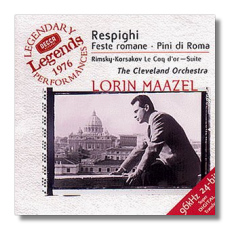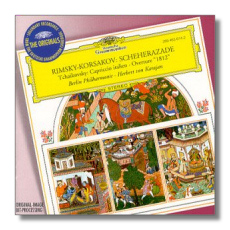
The Internet's Premier Classical Music Source
Related Links
- Latest Reviews
- More Reviews
-
By Composer
-
Collections
DVD & Blu-ray
Books
Concert Reviews
Articles/Interviews
Software
Audio
Search Amazon
Recommended Links
Site News
 CD Review
CD Review
Legendary Performances & Recordings

- Ottorino Respighi:
- Feste Romane
- Pini di Roma
- Nicolai Rimsky-Korsakoff: Le Coq d'or: Suite
Cleveland Orchestra/Lorin Maazel
Decca 466993-2 ADD 74:04


- Nicolai Rimsky-Korsakoff: Schéhérazade
- Piotr Ilyitch Tchaikovsky:
- Capriccio italien
- 1812 Overture
Don Cossacks Choir
Berlin Philharmonic Orchestra/Herbert von Karajan
Deutsche Grammophon 463614-2 ADD 79:05
On the whole, Maazel's stay in Cleveland throughout most of the 1970s produced fewer memorable recordings than the previous decade had. There were highlights nevertheless, and the Respighi and Rimsky-Korsakov programs recorded in 1976 and 1979, respectively, show both the conductor and the orchestra at the top of their forms. It is good to see their reappearance in Decca's "Legends" series. (Capriccio Espagñol and the Russian Easter Overture have been omitted here; I would be happy to see them reappear on another CD.)
Maazel does not apologize for music that is often is called vulgar; he doesn't pretend that it is subtle or delicate. In other words, he revels in Respighi's violently garish picture postcards. What sets his reading apart, however, is the clarity and steeliness of his textures; in these Roman festivals and among these Roman pines, you can hear details obscured in most other recordings. Interpretively, Maazel keeps a firm jaw and pushes forward, apparently not as interested in display for its own sake as he is in painting a sound-picture of an ancient Rome that was more brutal than Hollywood allowed it to be. Real blood flows in the Circus Maximus, and the winds that rustle the pines near the catacomb produce a virtual chill. Even Toscanini got a little out of hand and self-indulgent – see what I can do with my orchestra! – in the orgiastic finale to Feste Romane; Maazel "keeps it real," in today's language. The Rimsky-Korsakov is not as warm as Beecham made it, for example, but Maazel's interpretation is valid for those who prefer their fairy tales to be told with a backbone. Decca's production and engineering team excelled themselves at both of these sessions. The booklet notes are by Ivan March, whose breezy Penguin Guide to Compact Discs and Gramophone style is equally present here.
The Herbert von Karajan disc is part of Deutsche Grammophon's "Originals" series. According to Richard Osborn, author of the booklet notes, Herbert von Karajan waited until 1967 to record Schéhérazade because he was intimidated by the standard set a decade earlier by Sir Thomas Beecham and the Royal Philharmonic Orchestra. Perhaps this is true, although the anecdote seems most un-Karajan-like to me. It would be interesting to hear what Karajan would have made of this score in the 1950s, before the cult of personality that surrounded him became so pronounced. Of course this is Rimsky's Schéhérazade, but it is also Karajan's, and the Berlin Philharmonic's. The conductor's obsession with orchestral sound per se is in full flower with this recording. The violins saw at the melodies as if they were one gigantic instrument played by one gigantic bow, and the brass have the overpowering presence of a behemoth. Everything seems larger than life. This will come as no surprise to the conductor's admirers, nor to his detractors. What is surprising, though, is that the playing is not more refined. There's almost an adversarial relationship among the sections of the Berlin Philharmonic; the violins, the winds, the trumpets, the horns, and other soloists and sections take turns loudly vying for dominance. The only peaceable element throughout is the violinism of concertmaster Michael Schwalbé. His is the assertive yet "feminine" voice that stills the troubled waters. This is an exciting reading, but so far away from the Beecham recording that Karajan supposedly admired.
The Tchaikovsky fillers were recorded a year earlier. The Capriccio italien is powerfully exciting, driven with Russian fire instead of Italian warmth. Interpretively, it is not as extreme as Schéhérazade, yet it is cut from the same cloth, and its effects are calculated down to the last digit. In the 1812 Overture, Karajan has a famous Russian choir intone the Russian Orthodox hymn normally given to violas and cellos. The effect is special, although the Don Cossacks's approach to chord-tuning is anything but "textbook." Karajan brings the music to a sweaty climax, but the cannon blasts, clearly not "live," are unrealistic. The digital remastering is excellent overall, yet the trumpets (especially) have a harshness that might be intrinsic to the recording sessions. This is a wonderful disc if you want to enjoy a warm bath of orchestral sound, and a must for Karajan's many admirers. There are more generally compelling versions of these works, though.
Copyright © 2000, Raymond Tuttle


















